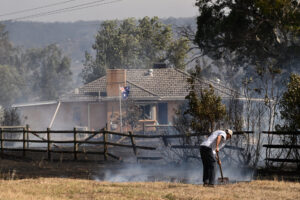Queensland’s revised coal royalty system has delivered billions to the state, and NSW could be following suit. But as always, the mining industry is keen to let hysteria get in the way of a good policy.
“There will come a day [when Queenslanders] will look back and rue changes that were made and how they were made because of the impact on that long-term investment,” BHP CEO Mike Henry said recently.
Rue the day!
What had the world’s most powerful mining executive sounding like an unmasked villain at the end of a Scooby Doo episode was a change to the coal royalty system, made by Queensland Premier Annastacia Palaszczuk and Treasurer Cameron Dick in June 2022.
The reform meant that coal companies like BHP pay more in royalties when coal prices are higher and less when prices are lower. It’s like Australia’s income tax system, where individuals pay a higher rate of tax as their income increases.
Queensland already had this kind of system in place, but the Premier and Treasurer added additional tiers to raise more revenue at a time of sky-high energy prices and record coal company profits driven by the Russian invasion of Ukraine.
How much money did this raise for the state’s economy? Based on initial figures, the Australia Institute’s estimate is $4.3 billion in 2022-23.
Like all states, most of Queensland’s revenue comes from its share of Commonwealth taxes, with mining industry royalties making a modest-at-best contribution.
Queensland typically raises between $2 billion and $4 billion per year in coal royalties, less than 5% of its total $88 billion budget. But in 2021-22, the war in Ukraine pushed the state’s coal royalties to $7.2 billion.
Then, in 2022-23, the royalty change and ongoing high coal prices saw the state budget bring in $15.3 billion, a serious windfall that the Government has been quick to link to a range of health and community spending projects.
Don’t feel too bad for the coal companies. We estimate that they pocketed an extra $85 billion over those two years.
So, will Queenslanders really rue the day that their Premier and Treasurer made BHP, Mitusbishi, Glencore and friends chip in a bit more for hospitals, water pipelines and half the cost of footy ground upgrade in Rockhampton? Will investors and the mining industry desert the state?
Not according to the Australian Bureau of Statistics, which says that private sector investment in the state has increased in the 12 months since the Government’s royalty change – an increase led by the mining industry.
BHP itself is investing in Queensland coal mines, which might seem unusual for a company that is supposed to be both getting out of Queensland and getting out of coal. The company shows no sign of abandoning its proposed Peak Downs mine that would operate in the state for another 93 years.
It seems more likely that the people ruing royalty and tax policy decisions are not in Queensland, but in NSW and the rest of Australia, where governments have lacked the courage, integrity or brains to follow Palaszczuk and Dick’s lead.
Nobel Laureate Joseph Stiglitz and a chorus of Australian economists, has urged the Australian Government to make the “no brainer” decision and boost taxes on energy companies following the Russian invasion. Other countries have, including Rishi Sunak’s conservative UK government (predicted to raise £5 billion in one year) and even Russia itself.
Bizarrely, in the lead up to the March NSW election, both major parties committed to protect coal company profits at the expense of the community, despite the unprecedented profits being made.
We estimate this bipartisan cowardice cost the people of NSW up to $6.2 billion, and that state’s government has just announced a review of the coal industry, including potentially modernising the royalty system to something like Queensland’s.
Queensland isn’t the only government to get more money out of the mining industry in recent times, but they may have triggered the most bluster.
Dan Andrews increased Victoria’s royalties on coal in 2016 and gold in 2019, was met with predictable bleating from lobbyists about “consequences”, which failed to materialise.
When the Federal Government recently increased tax on gas companies, the industry responded not with threats, but with “phew, that wasn’t as much as we’d expected.”
Australia’s politicians still live in fear of BHP and the campaign it and the other miners and gas companies funded against the Rudd Government in 2010.
But in the 13 years since, Australians have watched BHP and its friends dodging tax, stealing wages, lying about carbon emissions, lying about jobs, screwing Australian consumers and undermining climate action. Even black lung disease is back.
With this abysmal record, it is hardly surprising that BHP’s attacks on the Queensland Government aren’t hitting as hard as they would have in 2010.
A noisy campaign against sensible reform seems far less appealing than increased public funding for regional hospitals, water pipes and footy grounds.
Rue the day.
Between the Lines Newsletter
The biggest stories and the best analysis from the team at the Australia Institute, delivered to your inbox every fortnight.
You might also like
Why a fossil fuel-free COP could put Australia’s bid over the edge
When the medical world hosts a conference on quitting smoking, they don’t invite Phillip Morris, or British American Tobacco along to help “be part of the solution”.
Burning homes and rising premiums: why fossil fuel companies must pay the bill
Another summer, another round of devastation: homes lost, communities evacuated, lives upended.
Why it’s the perfect time for the Albanese government to defy the mining lobbies
Everybody knows the Albanese government has it easy in Parliament.



